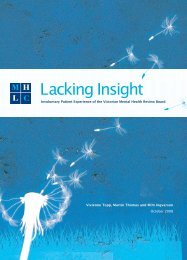Reducing Ethnic Profiling in the European Union - Open Society ...
Reducing Ethnic Profiling in the European Union - Open Society ...
Reducing Ethnic Profiling in the European Union - Open Society ...
- No tags were found...
Create successful ePaper yourself
Turn your PDF publications into a flip-book with our unique Google optimized e-Paper software.
The study found that persons of non-Slavic appearance made up only 4.6 percent of<strong>the</strong> riders on <strong>the</strong> Metro system but accounted for 50.9 percent of persons stoppedby <strong>the</strong> police at Metro exits. On average, non-Slavs were 21.8 times more likely to bestopped than Slavs. In one station non-Slavs were 85 times more likely to be stoppedby <strong>the</strong> police. These are extremely high levels of ethnic disproportion and cannot beexpla<strong>in</strong>ed on non-discrim<strong>in</strong>atory, legitimate law enforcement grounds. The study alsofound that <strong>in</strong> <strong>the</strong> vast majority of <strong>in</strong>stances, <strong>the</strong> police simply released those who<strong>the</strong>y had stopped. The study concluded that only 3 percent of police stops on <strong>the</strong>Metro resulted <strong>in</strong> <strong>the</strong> discovery of adm<strong>in</strong>istration <strong>in</strong>fractions such as <strong>the</strong> possessionof improper documents.FRANCE<strong>Ethnic</strong> <strong>Profil<strong>in</strong>g</strong> <strong>in</strong> ParisIn 2007, <strong>the</strong> <strong>Open</strong> <strong>Society</strong> Justice Initiative, <strong>in</strong> collaboration with France’s NationalCenter for Scientific Research (Centre National de la Récherche Scientifique) andLamberth Consult<strong>in</strong>g conducted an observational study of police stops at five locations<strong>in</strong> central Paris. The study ga<strong>the</strong>red data on 525 stops at different locationsknown for hav<strong>in</strong>g a high level of police activity. The study also ga<strong>the</strong>red benchmarkdata for over 32,000 persons it <strong>the</strong> same locations. 165As <strong>in</strong> Moscow, <strong>the</strong> study compared <strong>the</strong> population available to be stopped by policewith <strong>the</strong> population actually stopped by <strong>the</strong> police. Both <strong>the</strong> benchmark data and <strong>the</strong>stops were categorized accord<strong>in</strong>g to perceived ethnicity, age, gender, cloth<strong>in</strong>g, and<strong>the</strong> type of bag carried. In observ<strong>in</strong>g stops, monitors also recorded <strong>the</strong> outcome of<strong>the</strong> stop and, where possible, conducted a brief <strong>in</strong>terview with <strong>the</strong> person who hadjust been stopped to f<strong>in</strong>d out how often <strong>the</strong>y experience police stops, record <strong>the</strong>irassessment of <strong>the</strong> officers’ behavior dur<strong>in</strong>g <strong>the</strong> stop, and obta<strong>in</strong> a statement of <strong>the</strong>irreaction to be<strong>in</strong>g stopped.The study confirmed that police stops and identity checks <strong>in</strong> Paris are pr<strong>in</strong>cipallybased on <strong>the</strong> appearance of <strong>the</strong> person stopped, ra<strong>the</strong>r than on <strong>the</strong>ir behavior oractions. Persons perceived to be black or Arab were stopped at proportionally muchhigher rates than whites. Blacks were overall six times more likely than whites to bestopped by police and Arabs were 7.6 times more likely than whites to be stopped by<strong>the</strong> police (specific rates of disproportionality varied among sites). Follow-up <strong>in</strong>terviewswith <strong>the</strong> <strong>in</strong>dividuals who were stopped also suggest that <strong>the</strong>se two groupsregularly experience far more police stops than whites.REDUCING ETHNIC PROFILING IN THE EUROPEAN UNION 89
















